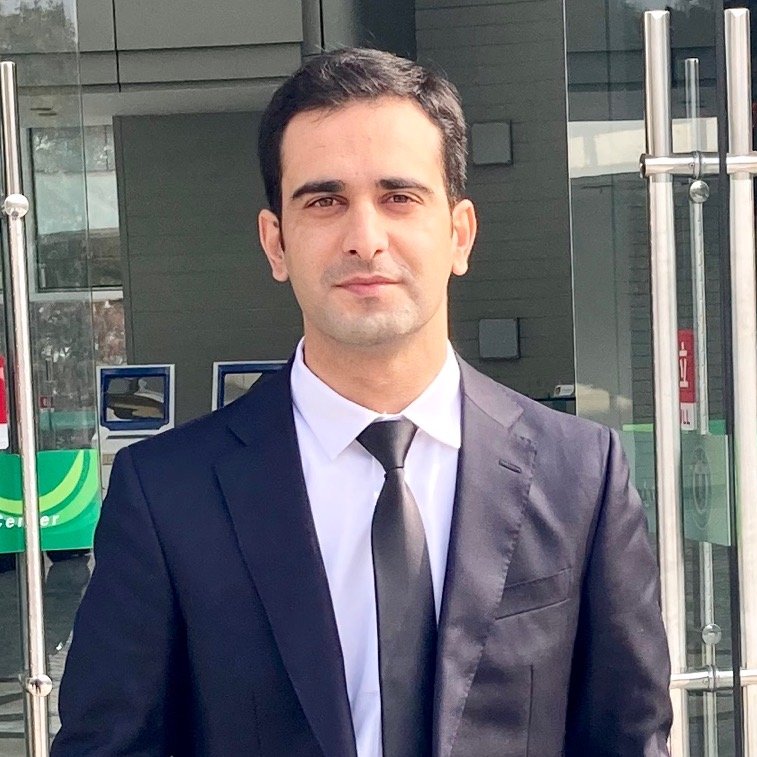
Dr. Sulaman Muhammad
Kontakt
Mehrzweckgebäude Universitätsstraße 22 - Raum 109
muhammad(at)b-tu.de
T +49 (0) 0355 69 2073
Sprechzeiten: nach Vereinbarung
Seit 04/2023: Wissenschaftlicher Mitarbeiter am Lehrstuhl für Energiewirtschaft, Brandenburgische Technische Universität Cottbus-Senftenberg
04/2021-03/2023: Post doc Wissenschaftlicher Mitarbeiter , Universität Shenzhen, Guangdong, China
02/2018-12/2020: Ph.D. in Wirtschaftswissenschaften und Ingenieurwesen, Jiangsu Universität, China
06/2015-08/2017: Ingenieur für elektrische Wartung, JASH Technical Services LLC., Al-Hasa, Saudi-Arabien
12/2013-04/2015: Beschaffungsingenieur, Seronic Private LTD., Islamabad, Pakistan
2012-2014: MSc in technischem Management, Muhammad Ali Jinnah Universität, Islamabad, Pakistan
Forschungsarbeit: Qualitäts- und Produktivitätsverbesserung von kleinen und mittleren Unternehmen in Pakistan
2008-2012: BSc in Elektrotechnik, COMSATS-Universität, Abbottabad, Pakistan
Forschungsarbeit: Entwurf und Analyse eines netzgekoppelten Photovoltaiksystems
Muhammad, S., Hoffmann, C., & Müsgens, F. (2025). Assessing energy security risks: Implications for household electricity prices in the EU. Energy, 136201. https://www.sciencedirect.com/science/article/pii/S0360544225018432
Muhammad, S., Hoffmann, C. (2024): From investment to impact: The role of green finance and technological innovation on German energy transition. Renewable Energy.
https://doi.org/10.1016/j.renene.2024.121665
Muhammad, S., Pan, Y*., Ke, X., Agha, M.H., Borah, P.S., Akhtar, M. 2023. European transition toward climate neutrality: Is renewable energy fueling energy poverty across Europe?
https://doi.org/10.1016/j.renene.2023.03.090
Muhammad, S., Pan, Y*., Agha, M.H., Umar, M., Chen, S. 2022. Industrial structure, energy intensity and environmental efficiency across developed and developing economies: The intermediary role of primary, secondary and tertiary industry.
https://doi.org/10.1016/j.energy.2022.123576
Muhammad, S., Pan, Y*., Magazzino, C., Luo, Y., Waqas, M. 2022. The fourth industrial revolution and environmental efficiency: The role of fintech industry. https://doi.org/10.1016/j.jclepro.2022.135196
Muhammad, S., Long, X*. 2021. Rule of law and CO2 emissions: A comparative analysis across 65 belt and road initiative (BRI) countries.
https://doi.org/10.1016/j.jclepro.2020.123539
Muhammad, S., Long, X*., Salman, M., Dauda, L. 2020. Effect of urbanization and international trade on CO2 emissions across 65 belt and road initiative countries. https://doi.org/10.1016/j.energy.2020.117102
Muhammad, S., Long, X*., Salman, M. 2020. COVID-19 pandemic and environmental pollution: A blessing in disguise?
https://doi.org/10.1016/j.scitotenv.2020.138820
Muhammad, S., Long, X*. 2020. China’s seaborne oil import and shipping emissions: The prospect of belt and road initiative.
https://doi.org/10.1016/j.marpolbul.2020.111422
Chi, M*., Muhammad, S., Khan, Z., Ali, S., Li, R.Y.M. 2021. Is centralization killing innovation? The success story of technological innovation in fiscally decentralized countries https://doi.org/10.1016/j.techfore.2021.120731
Yang, H*., Lu, Z., Shi, X., Muhammad, S., Cao, Y. 2021. How well has economic strategy changed CO2 emissions? Evidence from China’s largest emissions province https://doi.org/10.1016/j.scitotenv.2021.146575
Luo, Y., Lu, Z*., Muhammad, S., Yang, H. 2021. The heterogeneous effect of different technological innovations on eco-efficiency: Evidence from 30 China’s Provinces https://doi.org/10.1016/j.ecolind.2021.107802
Xu, J., Akhtar, M*., Hairs, M., Muhammad, S., Abban, O.J., Hesary, F.T. 202.2 Energy crisis, firm profitability, and productivity: An emerging economy perspective. https://doi.org/10.1016/j.esr.2022.100849
Salman, M., Long, X*., Dauda, L., Mensah, C.N., Muhammad, S. 2019. Different impacts of export and import on carbon emissions across 7 ASEAN countries: A panel quantile regression approach.
https://doi.org/10.1016/j.scitotenv.2019.06.019
Ahmad, M., Jiang, P., Majeed, A., Umar, M*., Khan, Z., Muhammad, S. 2020. The dynamic impact of natural resources, technological innovations and economic growth on ecological footprint: An advanced panel data estimation.
https://doi.org/10.1016/j.resourpol.2020.101817
Ahmad, Z., Chao, L*., Chao, W., Iqbal, W., Muhammad, S., Ahmed, S. 2021 Assessing the performance of sustainable entrepreneurship and environmental corporate social responsibility: revisited environmental nexus from business firms
